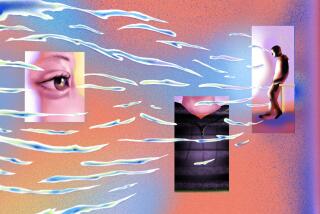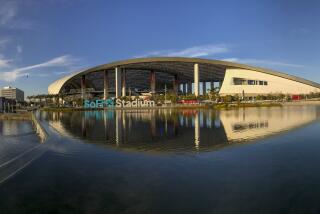A lingering twilight in Los Angeles
Summer of 1992, and Los Angeles was full of angst.
We felt bad about ourselves. And how could we not? A good chunk of the city had burned down over the course of two days of rioting. People had been beaten and killed in broad daylight.
Anna Deavere Smith came to L.A. then, visiting a city where resentment between ethnic groups and social classes had been laid bare. She was going to write about it.
“People were crying, weeping in grief,” Smith told me as we sat in a Westside hotel lobby this week.
She recited a few lines that echoed the characters in “Twilight: Los Angeles 1992,” her acclaimed one-woman play that resulted from that first visit nearly two decades ago:
“Why do we live in such a divided town? This can never happen again. Who are we? We can do better than this. Let’s come together. We can come together!”
Then Smith stepped out of character, and with a faint shake of the head delivered her assessment of what’s happened in L.A. in the years since: “And they did not.”
L.A., Smith told me, did not “come together.”
I had worked for Smith as one of her advisors back when she came to record and transcribe more than 300 interviews for the play, a one-woman show in which she transformed herself into an array of L.A. characters rich and poor.
Now Smith is back in L.A. with a new play, “Let Me Down Easy,” at the Broad Stage in Santa Monica, until Sunday. So I asked: How does L.A. look, close to two decades later?
Her answer: the same, only more so. The economic disparities that were at the heart of the 1992 explosion haven’t gone away.
“Probably the person who said the only color in Los Angeles is green was right,” she said. In L.A., as elsewhere in America, “There’s been this extraordinary increase in the gap between those who have and those who don’t.”
It’s hard not to agree with that observation when the unemployment rate in some L.A. County communities is hovering near 20% and our public schools and other services are being decimated by budget cuts. We are, without a doubt, a less optimistic people.
On the other hand, the horrific gang violence of the day — with its monthly “body counts” in the dozens — is largely a thing of the past. The races mix more freely than ever before, although a small minority of ignorant and intolerant Angelenos has a new bullhorn to play with: the Internet.
The riots changed L.A. in some important ways. The city matured, I think. We became wiser about ourselves. Our problems weren’t solved. But it became harder to deny their existence, thanks to the work of Smith and so many others.
“When I came to Los Angeles it was in disarray,” Smith told me. “I’m interested when things are upside down — because there are so many possibilities in that one moment. There is a lot that is exposed.”
Before “Twilight,” Smith had written a dozen plays in her series “On the Road: In Search of American Character.” But L.A. gave her the biggest canvas she’d ever had.
“I had never seen diversity like this,” said Smith, a native of Baltimore. “It totally changed me.”
The writer Mike Davis perhaps best summarized to Smith the many different things the riots were: a black “uprising” against a white-dominated police force, a “pogrom” against Korean merchants and a “poverty riot” in which some of the city’s poorest Latino immigrants looted their neighborhoods.
As her dramaturge, I watched for weeks as Smith constructed “Twilight” with verbatim passages from her interviews. She learned phonetic Korean and memorized monologues by Hollywood agents, teenage looters and thinkers like Cornel West. Afterward, she got invited to symposiums at Harvard and other places to talk about “race in America.”
“I became very unpopular at these events,” which tended to focus on racism against blacks, she told me. “I’d say, ‘You’re all here because of the L.A. riots. But you don’t want to talk about Asian people, or Latino people or even white people!’”
Smith’s new play also takes us to an unsettling place. In “Let Me Down Easy,” many different kinds of Americans — doctors, patients, artists and men of the cloth — talk about healthcare, illness and coping with the final stages of life.
It’s a play about pain and vulnerability, and the things we learn from loss.
David Wolpe, a rabbi at Sinai Temple in Westwood, lays out the theme in one short, poetic observation: “The only whole heart is a broken one,” he says. “It’s a kind of crack that lets light in.”
The people in “Let Me Down Easy” have seen their world turned upside down by illness. Like the Angelenos struggling to cope with the barbarity of the riots in “Twilight,” the trauma has revealed new truths about themselves and the country they live in.
There’s Brent Williams, a white, Republican rodeo star. Thrown from a bull in San Antonio, he’s tended to by doctors at a military hospital who charge him the astonishingly low “flat rate” of $1,200 for the complex surgery that saves his kidney.
“We all need a flat rate,” he concludes. Of his own, and other private insurance companies, he declares: “They’re just trying to rape us, like they raped the poor…. And they’re going to break the whole country, I think.”
I don’t think we’ve quite solved the inequities and illogic of our healthcare system. Nor have we succeeded in bringing L.A. “together” and making it whole and healthy.
In the wake of the riots, we looked at ourselves and saw ugliness: a shallowness that was common to the very rich and the very poor, and the consequences of ignoring historic inequities. But what have we done with that self-knowledge?
It seems to me we’re still in that place described by Twilight Bey, the former gang member who gave Smith’s play about the riots its name.
“It’s like I’m stuck in limbo, like the sun is stuck between night and day, in the twilight hours,” he says.
More to Read
Start your day right
Sign up for Essential California for news, features and recommendations from the L.A. Times and beyond in your inbox six days a week.
You may occasionally receive promotional content from the Los Angeles Times.







